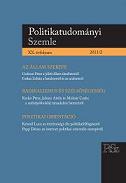A furcsa koalíció
A Strange Coalition
Author(s): Péter HavasSubject(s): Politics / Political Sciences
Published by: MTA Politikai Tudományi Intézete
Keywords: Conservative Party; Liberal Democrats (party); Labour Party; electoral systems
Summary/Abstract: The paper has got its title ”A Strange Coalition” mainly because in May 2010, participants in this coalition the Conservative and the Liberal Parties reached handshake tough in many points of view they had differed from each other’s values and there had not been any precedent of such for almost 80 years. After summarising political processes that led to the coalition including the victory of the Conservative Party without an overall majority, the paper is in fact dealing with one general dilemma: whether the coalition be understood as a practical effort to handle a political crisis, or is it rather a fi rst step in order to the renewing politics? From this aspect the paper analyses the pillars of the coalition: the measures of implementation for the stabilisation of the economy and fi nance, introducing drastically increased tuition fees in the universities and the arrangement of the electoral reform. According to the paper while for the Liberal Democrats, as members of the coalition the support of the fi rst and second task meant challenges and leading to losing popularity of the party, the true crisis of coalition has been generated by the events about the reform of the electoral system. The Conservative Party as a leading force of the coalition supported the referendum on Alternative Vote that has been a defi nite term for Liberals to join, but when the referendum came they not only voted against, but became the main anti-Alternative Vote camp and due to that contributed to a crushing defeat of the reform and Liberals as for the main supporters of the alternative system. It proves that the Conservatives are still in favour of the majority system because it serves their political interests and they would like to win the election alone. In spite of such diffi culties, the paper’s conclusion is that this coalition has some benefi ts for both participants. While its destiny is still on the balance, however, its conditions are today less stable than they were in 2010, and the Conservative domination in the coalition is stronger. The logic of the paper is clearly suggesting that the future of the coalition in a signifi cant degree depends on the politics of Liberal Democrats, depending on whether they are able to save their social-liberal identity, and will not avoid confrontations with the Tory Party. Until then suppositions that this coalition can lead to the rearrangement of the British party system remain open, and one should be satisfi ed with the strange coalition that can be interpreted also as a fi rst step to a multiparty system.
Journal: Politikatudományi Szemle
- Issue Year: 2011
- Issue No: 2
- Page Range: 131-150
- Page Count: 20
- Language: Hungarian

